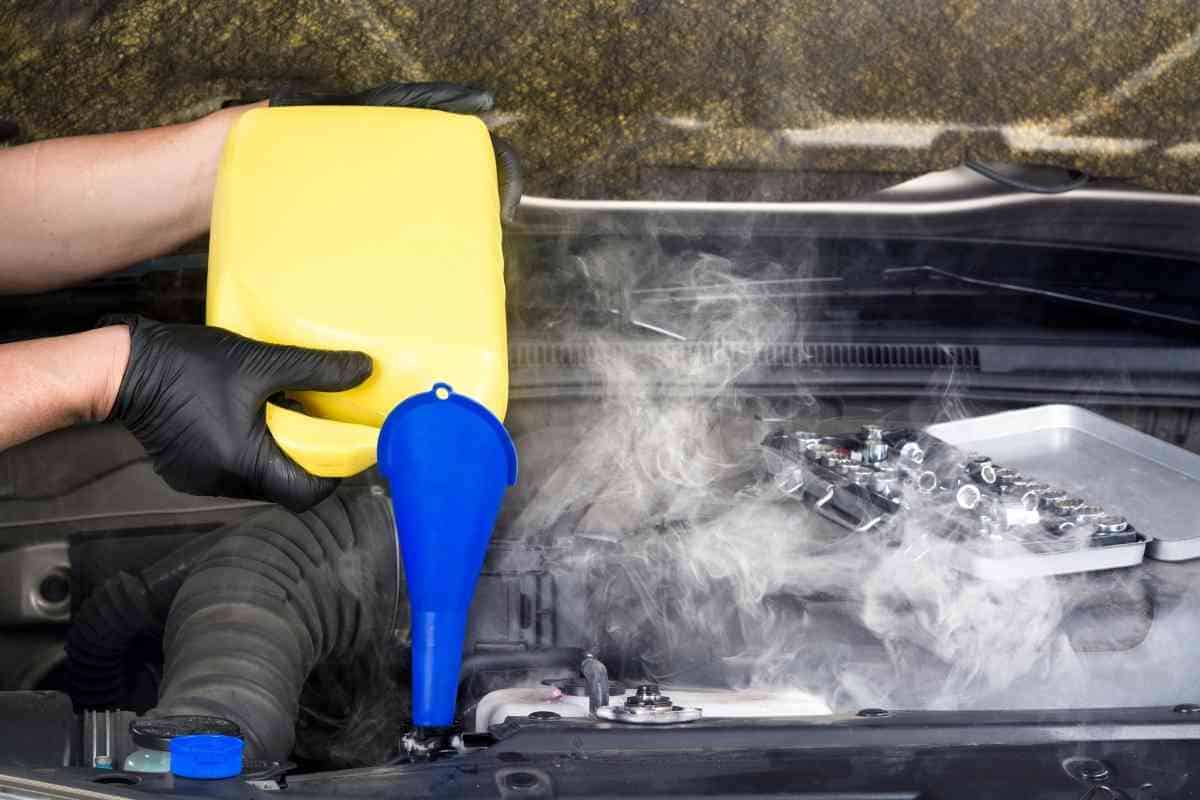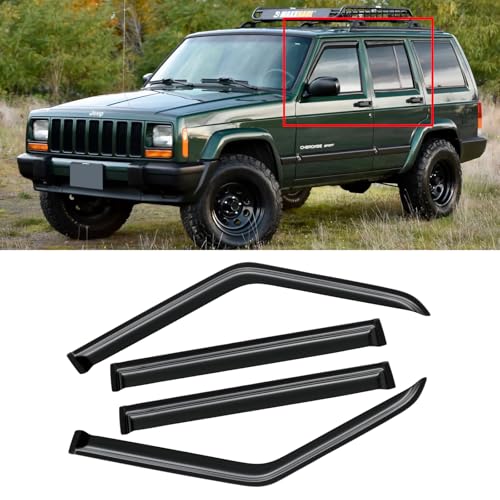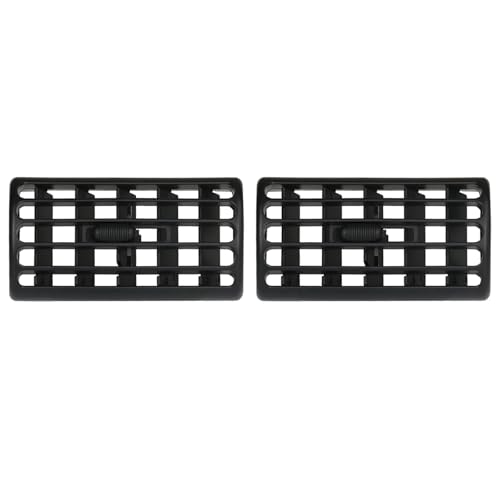9 Basic Reasons Why Jeep Cherokees Overheat
Here at Four Wheel Trends, we love our Jeeps. So, we’ve gotten to know the common culprits behind an overheating Jeep Cherokee.
Our article, “9 Reasons Why Jeep Cherokees Overheat” unpacks the key factors why Jeep Cherokees overheat and how to address them effectively.

For many decades we have adored our Jeeps. The Cherokees are one of the original SUVs to hit the market. They’re roomy, comfortable, useful – and long-lasting.

“Drive Past Myths: Get the Real Deal on Car Buying!”
🚘 Uncover 13 Car Buying Misconceptions with Our FREE Newsletter!
Plus you will get our quick tips, expert advice, and myth-busting insights delivered straight to your inbox.
Subscribe now and make informed decisions without the detours.
“Experts Hate This! Learn the Car Buying Secrets They Don’t Want You to Know. Free Subscription!”
But, while they may run for well over 100,000 miles, that does not mean that you won’t have problems throughout the life of the vehicle. One major complaint of the Cherokee is that they have a nasty habit of overheating, so let’s find out why.
A damaged thermostat or radiator, leaky hoses and a damaged engine gasket are some of the reasons why Jeep Cherokees overheat. Fortunately there are steps to diagnosing them easily.
Why Do Jeep Cherokees Overheat?
Why Do Jeep Cherokees Overheat? The top 9 reasons for a Jeep Cherokee overheating are:
- Thermostat
- Coolant leak/no coolant
- Radiator
- Hoses and belts
- Oil change
- Fuses
- Water pump
- Catalytic converter
- Head gasket
They, like the other Jeep models, can be driven far into the high mileage category. Why is your Cherokee such a hot head?
Let’s take a look at the leading causes of overheating.
How To Diagnose Why Jeep Cherokees Overheat
Are you handy under the hood? As with most things, it probably will be cheaper if you are able to fix your vehicle yourself. Most times, the labor can be more expensive than the parts themselves.
Pay yourself the $75 an hour and roll up your sleeves because most of the following parts can be replaced or repaired by the eager and willing.
1. Thermostat
Mention to any wise mechanic that you are having some overheating issues with your Jeep Cherokee, and their first response will most likely be to check the thermostat. A thermostat regulates how much coolant the radiator is receiving as the vehicle’s temperature rises.
A common problem with thermostats is that they can get stuck. When a thermostat is stuck, the valve is either continuously closed or open. In either case, it needs to be replaced immediately.
When the thermostat is stuck open, the vehicle will be getting too much coolant. On the other hand, if it is stuck in the closed position, the radiator will not be getting any coolant at all.
If you do end up replacing the thermostat, make sure the new part is an exact match to your make and model of Cherokee. Installing a thermostat made for a different vehicle could cause major damages, as each one is calibrated for a specific automobile.
2. Coolant Leaks
We know that coolant is the fluid that flows through the radiator and reduces the temperature. In a healthy functioning vehicle, the coolant would dramatically help to prevent the vehicle from overheating.
First of all, before we go on a mission to find leaks – have you topped off your coolant/antifreeze lately?
Though it may be a common routine maintenance item, not everyone regularly checks their coolant.
If the reservoir is empty or very low, you might just need to take a trip to the local parts store and pick up a gallon of high-quality coolant to fix your problem. Wouldn’t that be great?
Great that you caught it before it did major damage. It is not recommended to run a vehicle without coolant because many other costly parts of the engine could fail.
Not everyone is that lucky, though. The cause of an empty coolant reservoir can mean leaks. The most obvious leak would be in the reservoir itself. They are made of plastic that can corrode or crack over time.
3. Radiator
An overheating vehicle often has a root cause of issues with the radiator. Thankfully, most of the time, you only need to replace parts of the radiator and not the entire thing.
It could possibly just be an internal clog or external blockage with debris in the fins of the radiator.
Radiator fans can go bad over time, causing the vehicle to overheat due to no cooling coming from a bad fan. Or, you may just have to check the fan’s fuse to fix the problem.
Could your overheating problem be solved with a simple fuse replacement? Possibly.
The Cherokees that have a fuse powered fan to cool off the motor will overheat if the fuse blows the fan will not kick on and do its job to bring down the temperature of the motor.
If there is a leaky radiator issue, you could remedy this with a stop-leak fluid product. There could also be a leak in the hose. Thankfully hoses are often simple to replace and quite affordable.
If it comes down to a total replacement, don’t delay making an appointment with your mechanic. Continuing to drive a vehicle with a bad radiator risks causing bigger damage.
4. Belts and Hoses
There are several belts that may cause overheating just by being loose or worn out. Similarly, hoses can deteriorate or become loose.
Belts like the serpentine belt may wear out. When it wears out, your water pump will not be able to do its job if water cannot be pumped in to cool the engine and radiator.
Hoses such as the radiator hose can become loose, in which case you will only need to tighten or replace the clamp. If the hose is old and worn out, it shouldn’t be an expensive repair.
5. Oil
If you are dedicated to your regular oil changes, you may not need to worry about this step. But if you have been neglecting getting/giving a proper oil change for quite some time, especially if you have been driving the vehicle while it is overheating.
An oil change could be just the thing your Cherokee needs to chill out. Draining old oil, and refilling it with fresh oil, plus changing the oil filter will make it run better. But if the oil level is too low, you will definitely experience overheating.
6. Water Pump
Your water pump is like the heart of your vehicle because it pumps coolant through the motor, through the veins of your vehicle(hoses), and to the radiator. It is a belt-driven part, so checking your belts at this time is a good idea, too.
- High pitched whining noises.
- Coolant leaking.
- Steam coming from under the hood (radiator.)
When replacing your water pump, it is also a good idea to flush and refill your coolant. A gallon of coolant is cheap, so starting fresh won’t cost you a ton. But it will help to boost the vehicle’s performance after an episode of overheating. Replacing a water pump is often a few hundred dollars, and unfortunately is not a job for most of us home mechanics.
7. Fuses
A common reason why Jeep Cherokees overheat is because of a blown fuse. Before you dive deep into checking other deeper checks, inspect the fuse box.
If there any blown fuses, you can replace them, and check if your Jeep Cherokee is overheating. If it operates normally, then it was the fuse.
However, we don’t recommend that you simply replace the fuse and carry on with your life. There could be an underlying issue causing the fuse to blow.
As you’ve seen, there are plenty of reasons why Jeep Cherokees overheat. The following two are the most severe.
8. Head Gasket
Fortunately (and unfortunately?), a blown head gasket can be a painfully obvious reason why Jeep Cherokees overheat. And the signs can be hard to miss. Things to look for that point to this costly repair:
- Possible engine knocking sound
- Excessive white smoke coming from the exhaust pipe
- Coolant leaks from the exhaust gasket, or constant low coolant levels with no leaking
- Overheating under the hood
Use extreme caution when opening the hood of an overheating car. Wear all the protective gear to avoid getting steam burns or hot fluid burns, plus gloves for hot surfaces.
It’s best to let the vehicle cool down for at least an hour before working on it, when possible.
9. Catalytic Converter
 Jeep Cherokees Overheat?” class=”wp-image-11610″/>
Jeep Cherokees Overheat?” class=”wp-image-11610″/>We saved the most expensive fix for last. A damaged catalytic converter is a common reason why Jeep Cherokees overheat.
Unfortunately replacing a catalytic converter is not a job for most weekend warrior mechanics. This repair can cost several thousand dollars.
For some, it can be a repair they are not willing to get done. Especially for older Cherokees that may not be worth that much to them.
If you’ve gone through the list and have not yet fixed the overheating issue it is time to get the catalytic converter looked at by a professional. What are the signs of a bad catalytic converter?
- Dark smoke coming from the exhaust pipe.
- A strong sulfur like smell.
- Overheating under the hood.
- Loss of power during acceleration.
Closing Thoughts: Why Jeep Cherokees Overheat
Though we love them, we also know they can be hotheaded and many wonder why Jeep Cherokees overheat? This issue, though daunting, can often be resolved with some know-how and diligence.
From simple fixes like checking the thermostat and coolant levels to more complex issues involving the water pump or head gasket, the key lies in thorough diagnosis and timely intervention.
This article not only equips Jeep Cherokee owners with the knowledge to identify potential overheating issues but also offers practical solutions. While some problems may require professional attention, many can be tackled by owners themselves, potentially saving on costly repairs.
Regular maintenance, such as oil changes and checking hoses and belts, is also highlighted as a crucial step in preventing overheating.
Ultimately, understanding and addressing the reasons behind a Jeep Cherokee’s overheating can extend the vehicle’s longevity and ensure a safer driving experience. Whether it’s a minor coolant leak or a more serious issue like a damaged catalytic converter, being proactive and well-informed is the best strategy for any Jeep Cherokee owner facing overheating problems.
3 Best Selling Jeep Cherokee XJ Accessories!
Last update on 2026-02-12 / If you click this affiliate link and make a purchase, we earn a commission at no additional cost to you.




Halo, may jeep over heat’s from down